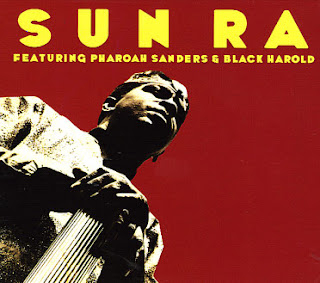Gods on Safari
The Cellar Cafe, NYC
June 15, 1964
Personnel:
Sun Ra P,CS
Al Evans TP,FG
Chris Capers TP
Teddy Nance TB
Bernard Pettaway TB
Robert Northern FH
Marshall Allen AS,FL
Pharoah Sanders T
Danny Davis AS,FG
Robert Cummings BCL
Pat Patrick BS
Black Harold FL
Alan Silva B
Clifford Jarvis D
Art Jenkins - space voice
LINK RETIRED
Wikipedia
Featuring Pharoah Sanders and Black Harold is a jazz album by Sun Ra, recorded live in 1964, but not released until 1976, on Ra and Alton Abraham's El Saturn label. The record documents the earliest known recorded performance of "The Shadow World" (here reverse-named as "The World Shadow"), a complex structured piece which was to feature on several of Ra's better known records of subsequent years, notably The Magic City.
Featuring Pharoah Sanders and Black Harold is a jazz album by Sun Ra, recorded live in 1964, but not released until 1976, on Ra and Alton Abraham's El Saturn label. The record documents the earliest known recorded performance of "The Shadow World" (here reverse-named as "The World Shadow"), a complex structured piece which was to feature on several of Ra's better known records of subsequent years, notably The Magic City.
It is an unusual item in the Ra discography, because tenor saxophonist Pharoah Sanders replaces John Gilmore, a mainstay of the Arkestra for most of its existence; at the time, he was working in other contexts, with the pianists Paul Bley and Andrew Hill, and drummer Art Blakey.[1] Before releasing the recording, Sun Ra said "It should be very interesting to the world to show what the pre-Coltrane Pharoah Sanders was like" [2] Also featured is the obscure flautist, Black Harold (Harold Murray) [3], who takes a solo, vocalising through his flute, Rashaan Roland Kirk-style, on 'The Voice of Pan' (continuing into 'Dawn over Israel.')
Despite being Sanders' only recording with Sun Ra, he is not a major presence, taking only one solo on the first track. Ra himself plays several short piano solos and introductions. Alan Silva also has a brief bass solo, and alto saxophonist Marshall Allen provides his customary fireworks. The music is mostly in the experimental, free-jazz mould, and though not quite as radical and challenging as 'The Magic City', it is mostly dense and uncompromising (though that is not to say there is no variety - there are plenty of quiet interludes as well).
The recording is criticised by Pierro Scaruffi, who writes: "[During the 60s, Ra's] albums became more irrational and experimental. Strange Strings (1966)...was still accessible compared with Featuring Pharoah Sanders and Black Harold (June 1964), released in 1976, whose The Voice of Pan and Dawn Over Israel were childish orgies of random sounds."[4] Sean Westergaard's review on allmusic.com similarly describes it as "more of a curio than a great listening experinece, and probably best left for the Ra and Pharoah Sanders completists." [5]


No comments:
Post a Comment